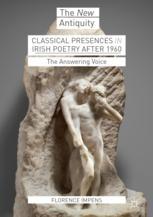

Most ebook files are in PDF format, so you can easily read them using various software such as Foxit Reader or directly on the Google Chrome browser.
Some ebook files are released by publishers in other formats such as .awz, .mobi, .epub, .fb2, etc. You may need to install specific software to read these formats on mobile/PC, such as Calibre.
Please read the tutorial at this link. https://ebooknice.com/page/post?id=faq
We offer FREE conversion to the popular formats you request; however, this may take some time. Therefore, right after payment, please email us, and we will try to provide the service as quickly as possible.
For some exceptional file formats or broken links (if any), please refrain from opening any disputes. Instead, email us first, and we will try to assist within a maximum of 6 hours.
EbookNice Team

Status:
Available0.0
0 reviewsThis book provides the first overview of classical presences in Anglophone Irish poetry after 1960. Featuring detailed studies of Seamus Heaney, Michael Longley, Derek Mahon, and Eavan Boland, including close readings of key poems, it highlights the evolution of Irish poetic engagements with Greece and Rome in the last sixty years. It outlines the contours of a ‘movement’ which has transformed Irish poetry and accompanied its transition from a postcolonial to a transnational model, from sporadic borrowings of images and myths in the poets’ early attempts to define their own voices, to the multiplication of classical adaptations since the late 1980s -- at first at a time of personal and political crises, notably in Northern Ireland, and more recently, as manifestations of the poets’ engagements with European and other foreign literatures.